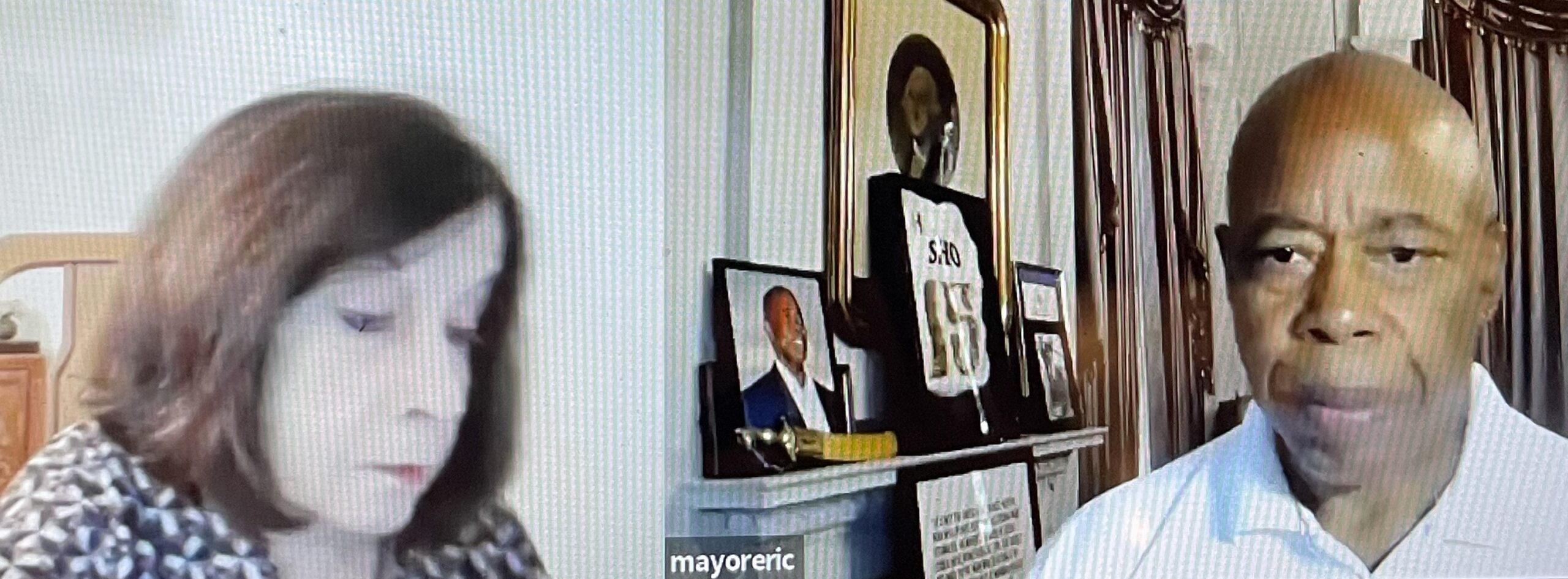
Mayor Eric Adams on National Elections, the Migrant Crisis, and New Yorkers.
A One-on-One Interview with Mayor Eric Adams
Eric Adams, Mayor of New York, sat for a one-on-one interview with Lavina Melwani of Lassi with Lavina and spoke about all things New York, starting with the upcoming National Elections.
[dropcap]N[/dropcap]ew York is seen as a really blue state so how important is it to get out the vote there and how can one influence the swing states? “You know, oftentimes people believe that New York City is a state that’s not in play, but every vote matters, not only what they can do here in their home state, but we all know someone in one of these swing states, if not more than one, and we should reach out and encourage people to come out and vote and participate. I’m hoping that they will get engaged, because it’s important, no matter who you vote for, it’s important that we go out and exercise our right to vote.”
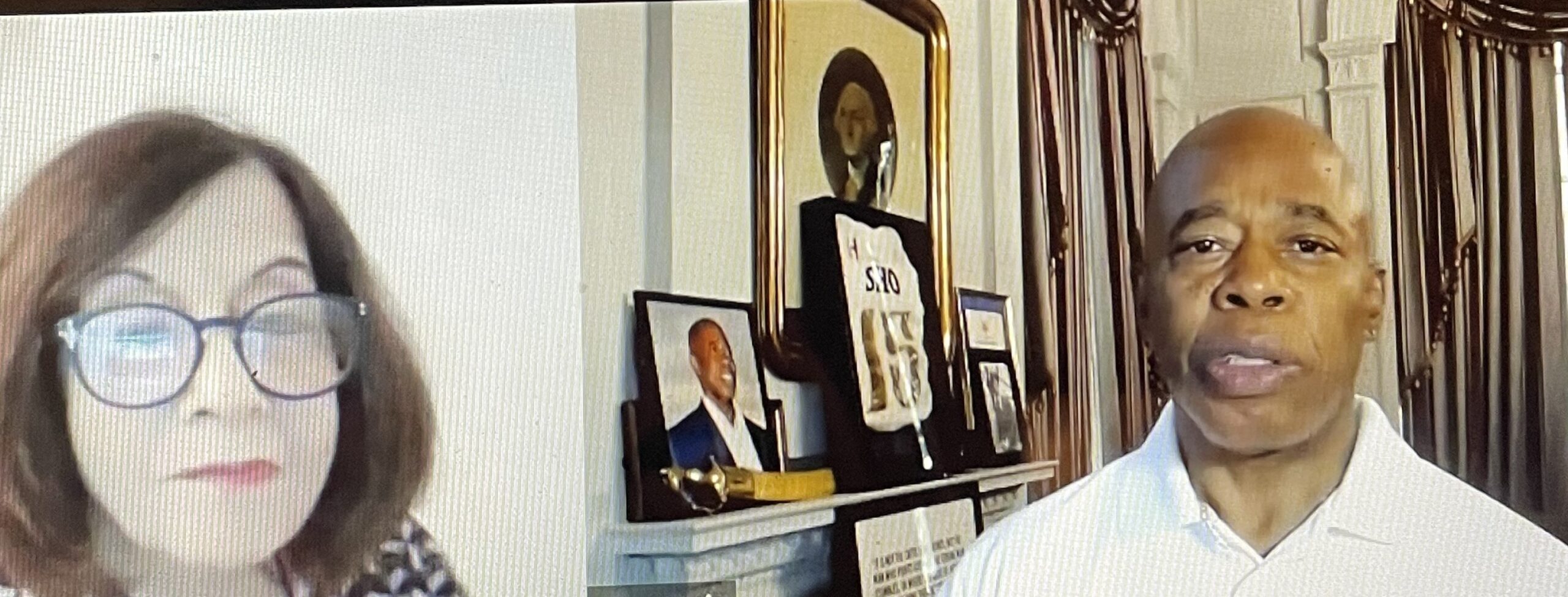
Two issues which often stress New Yorkers out are both people issues – the migrant crisis and the homeless situation in the city which both need solutions. Speaking of the migrant issue, he said: “Well, it’s a humanitarian crisis that we must address, and I think we can turn this crisis into an opportunity.
We are dealing with population decreases in many parts of the country, and when you have a large number of people who are coming into the country with a desire to work and participate in the American dream, that is the perfect match. I think that we should tell people who are paroled into the country legally that they are to go to one of the areas that we assign them to in the country that has a population problem and have them remain there for three years. After three years of working and contributing to society, they can move freely throughout the entire country.
Right now, we are allowing the crisis to control us – instead of us controlling the crisis. We should not allow people to move freely throughout the country, oversaturating the cities, going to places that don’t need the population. And most importantly, we need to allow those who are migrants and asylum seekers who are paroled into country, allow them the right to vote.”
The other problem New York has is of the homeless – with nowhere to go. It is very disturbing to see our local fellow citizens on the streets, and a lot of them happen to have mental issues.
“I’m glad you stated that,” said Adams. “Our street homeless problem is basically a mental health problem, and it must be treated as such, and we have really disinvested in the number of statewide beds and years ago, we closed our psychiatric facilities, and didn’t have a place where people who are dealing with severe mental health issues can go. We have to rethink that.
I believe we need to open a state-of-the-art psychiatric facility that can give people around the clock care in a very humane way, not how we’ve done it in previous years, during the 60s and 70s, when we basically warehoused people. We don’t have to do that, but we do need to acknowledge that there are those who can’t take care of themselves, and they are a danger to themselves and dangerous to others, and we must have a place for them to go.”
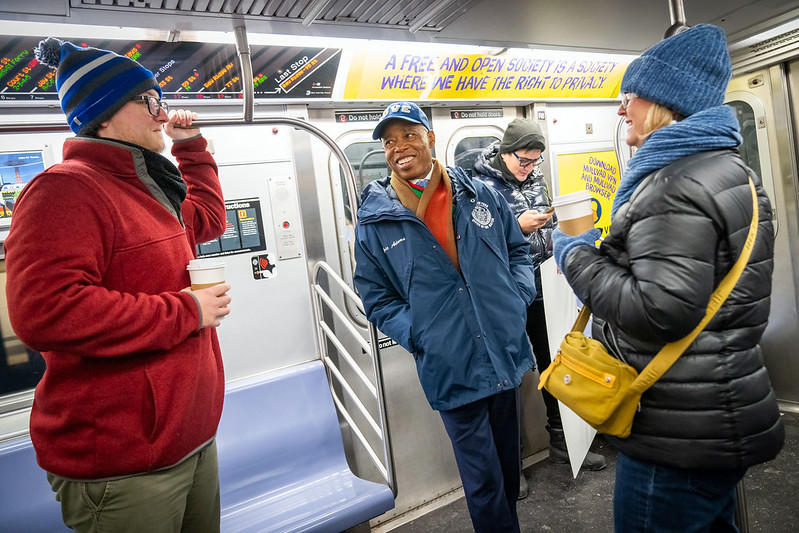
[dropcap]O[/dropcap]n the issue of space in New York City – unaffordable apartments and empty office buildings, there are solutions possible. As Adams pointed out, his administration was successful in getting the office conversion bills passed in Albany: “We have vacant office spaces which can be turned into affordable housing, and we have been really successful in getting Albany to come along with us.
“The next part of that is the City of Yes housing proposal that we have in front of the City Council. We have a housing problem that is really rooted in the lack of available housing spaces. We have to build our way out of this, and that is what we are proposing in the City of Yes proposal. We now need the City Council to pass this piece of legislation so we can build more housing. Our goal is to build 500,000 more units of housing. We’re doing our job – now it’s time for our city lawmakers to join us.”
Since New York is a very complex place with a lot of challenges, what would the Mayor count as the highlights of his tenure?
“Well, first of all, I love the fact that the city is a complex city, because we are complex individuals. I like to say 8.3 million people with 8.3 million opinions, and that’s every day. I’m just really pleased as I like to call myself a blue-collar mayor, and probably one of the first union mayors, union card-carrying individuals as the mayor of the city.”
Adams says his goal has been to lift up the working people, including city employees and there are over 300,000 who have settled their union contracts and improved their living standard, salaries and benefits. Other highlights have been building and financing more affordable housing in one year, for two years in a row in the history of the city. There’s free high speed broadband, more small businesses are up and running, and more private sector jobs are available in New York City.
From bringing down crime to education to improving the economy, Adams cites the many programs taken on by his administration. “You’re seeing how we have managed the difficulties of running the city that is as complex as you indicated.
Public safety is a prerequisite to our prosperity, and I know some of the high profile crime cases on our front pages, but when you do an analysis, we are clearly the safest big city in America, and we are continuing to get safer every day in the city.”
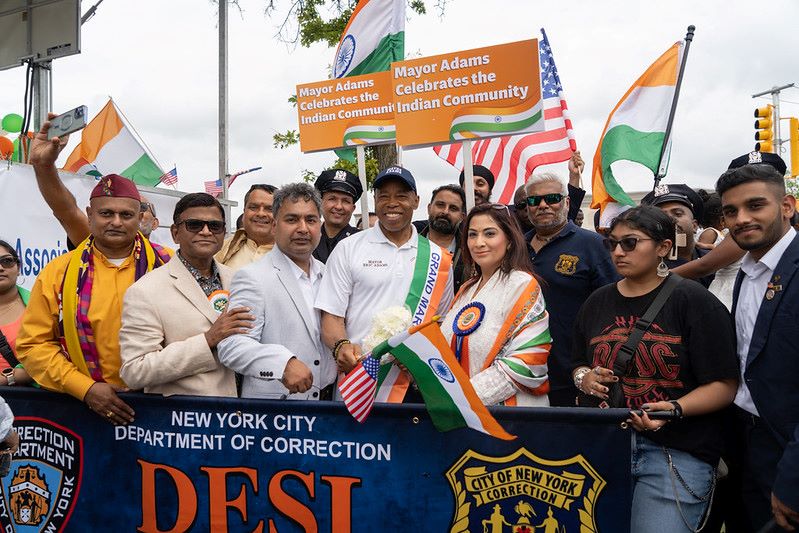
[dropcap]I[/dropcap]ndian-Americans were delighted when last year Diwali was declared a public-school holiday. So, what are the Mayor’s plans for this Diwali coming up in November?
“Well, first of all, hats off to Assemblywoman Jennifer Rajkumar! With her ability to navigate Albany with our support for finding a school day, we were able to make Diwali a holiday. I am just so pleased by that. And we had the first Diwali celebration at Gracie Mansion last year. We look forward to doing it again and making it a big Diwali celebration. We need a little more light in our lives so Diwali is coming right on time.”
I asked the mayor about the many Indian-Americans involved with his Administration. He said, “We have shattered the glass ceilings that hovered over Indian Americans.” He mentioned Deputy Mayor Meera Joshi who is the first Indian-American deputy mayor of New York in the history. He also mentioned Dilip Chauhan is the Deputy Commissioner in the Mayor’s office for International Affairs and Dr. Ashwin Vasan is the Commissioner of the New York City Department of Health and Mental Hygiene, who has been doing cutting edge initiatives that are dealing with everything from mental health to how social media impacts our families.
Of the Indian-American population Adams said, “It is one of the most successful populations in the city and country. When you look at their spending power, their academics, their professionalism, it really is one of the most successful American stories. You know, the early arrival of Indian immigrants have really made sure the next generation continues to improve and advance. Really hats off to the community!”
So, what excites the Mayor of New York the most about his city?
He said with a wide smile, “People! I love people. Nowhere else on the globe would you see this level of diversity in languages, food, culture, and dance. You know, this country tells you that you don’t have to abandon your homeland to appreciate your adopted land. In fact, you’re encouraged to bring everything about your homeland to this country and that cross-pollination creates this great experiment of how we come together and produce this product we call the American Dream. I’m excited about the people I meet here in the city every day and being in all the different areas of the city in the process.”
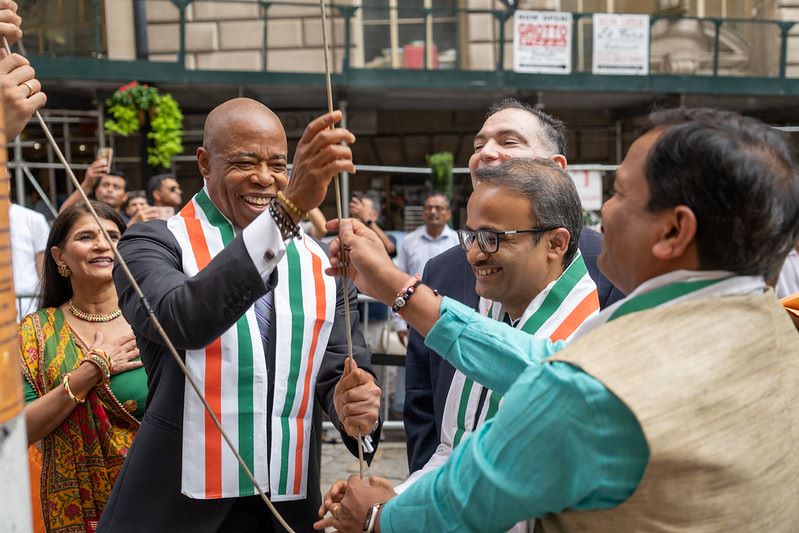
Finally what message would Mayor Adams like to share with the readers of Lassi with Lavina?
“We’re just seeing so much war and anxiety, so much stress and uncertainty, it is important that we lean into our faith. I always think about when I was in New Delhi and visited India, there was a place where you saw where our leader, Gandhi, took his last few steps. It is a permanent imprint in the concrete, and we have an obligation to continue the steps of Gandhi. That assassin bullet should not stop us from ensuring that we create a better society here in America and in India and throughout the entire globe. And so that’s my message – let’s continue our leader Gandhi’s steps to make sure that the assassin bullet did not kill the dream when we lost him physically.”
Related Articles:
Mayor Eric Adams Diwali Reception for New Yorkers
New York Mayor Eric Adams: My One-on-One Interview
